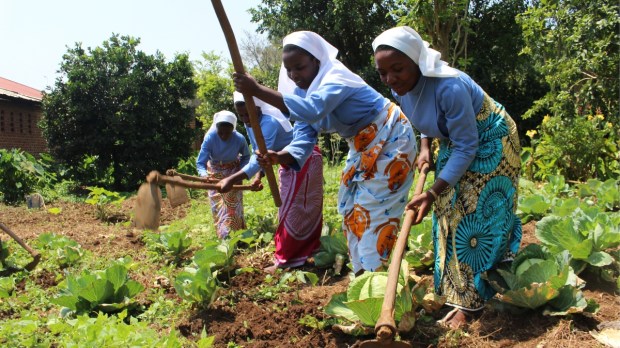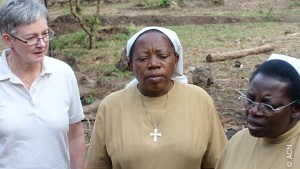Manual labor is already part of the rule of the Daughters of the Resurrection, but in this convent of Mirhi, on the shores of Lake Kivu in the far east of Congo, they must work just to eat. Since the civil war that broke out in 1995, the whole region has been living with invasions by various armed groups, which maintain a climate of great insecurity, prevent artisans from trading, and keep the population in poverty.
The nuns therefore go out carrying gardening tools to hoe cabbages, harvest corn, and maintain the large banana fields that adjoin their monastery. The generosity of nature, the mild climate of these slightly elevated regions, and the smile of the sisters could make us forget the precariousness of their situation. In North and South Kivu, the population, which is excessively poor, is subjected to the whims of the militias, who plunder the resources of a very rich country.
Training for the underprivileged
Sr. Alphonsine Tchiza points to a group of young girls who surround a sister in an apron: “Here we teach them to cook. They couldn’t study at school, but at least they will have training to find a job.”
In the hilly countryside around the convent, peasant families share the same difficulties. They have too little land and fear that they will have to abandon their fields at any moment, under threat from the militia, to join the flood of deprived people who crowd the slums of the nearest city, Bukavu. They desperately lack prospects for the future.
“They don’t understand why they can’t get by,” says Sr. Alphonsine. Before the 1995 war, they were not rich, but they could live peacefully. Now, year after year, they see their situation collapsing. Imported food is unaffordable and trading has become very complicated. They can no longer move around in their own country because of the armed gangs that are everywhere. Teachers have not received a government salary since 1995, and hospitals are inaccessible to those who do not have money.
A last resort
In this disastrous context, the Sisters represent a last resort for the poorest of the poor. Among them, they cite the example of Xaverine who, in addition to her five children, has taken in a single mother, Chantal, and her three children. Her husband, Tuombe, is blind and cannot help her much at home. “But he does what he can, he’s a good man,” says Sr. Alphonsine with a smile.
She tries to find him odd jobs that are compatible with his disability. Strangely enough, this blended family functions quite harmoniously and the children almost all go to school, where they are among the brightest elements.
Tuombe has a mute friend, Karani, with whom he has strange conversations despite their relative disabilities. “No one understands how they communicate, but it works very well between them. They can talk together for hours, exchanging gestures and slurred sounds,” Sr. Alphonsine says with amusement.
In the ocean of misery in eastern Congo, the sisters have created a haven of charity to defend the rights of those who have nothing left.


